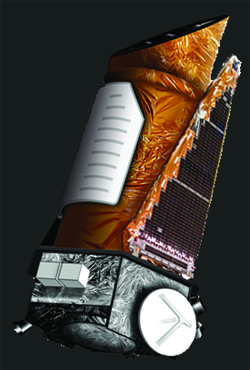Today was a sad day for science. NASA formally announced it is ending its search for Earth-like planets with the Kepler Space Telescope, which is to say its search for liquid water outside our solar system.
I reported on the ailing craft in the May 13 EarthDesk, and reflected on its profound mission:
NASA conducts much groundbreaking research relevant to our relationship to the planet, such as its work on climate change and the atmosphere. I am particularly taken with the Kepler mission. If life is not a proprietary innovation of Earth’s, and it is likely not, there is much we do not understand about life itself and the much larger environment we call home. We can learn from other worlds.
Today the Kepler team said that it could not accomplish necessary repairs to operate with the precision required for planetary detection. An astronaut repair team cannot be sent, as it was for the Hubble telescope, because Kepler orbits the Sun, not Earth.
NASA is entertaining research proposals that will utilize Kepler’s remaining capabilities. And though the primary mission has concluded, there are still years of data left to analyze. A NASA conference will be held on November 4 at the Ames Research Center in Moffett Field, Calif to discuss the accomplishments and the work ahead for the Kepler team.
William Borucki, Kepler’s principal science investigator at Ames said:
At the beginning of our mission, no one knew if Earth-size planets were abundant in the galaxy. If they were rare, we might be alone. Now at the completion of Kepler observations, the data holds the answer to the question that inspired the mission: Are Earths in the habitable zone of stars like our sun common or rare?
I have spoken often about the Kepler mission when I lecture. I learned very few people are aware of it, which is unfortunate. At a time when it is commonplace to discuss our environmental future in planetary terms, it is certain that important discoveries await us in other planetary systems.
And some discoveries still may come our way as unanalyzed data are examined, according to Borucki.
We expect hundreds, maybe thousands of new planet discoveries, including the long-awaited Earth-size planet orbiting a star as hot as our sun.
To date, Kepler has confirmed 135 planets outside our solar system, and 3,548 candidate planets. But the physical search itself is concluded and, at present, NASA has no plans to replace the Kepler telescope.
More from the full NASA news release










